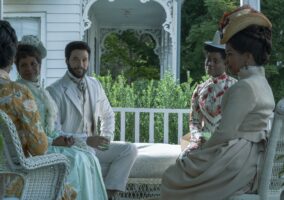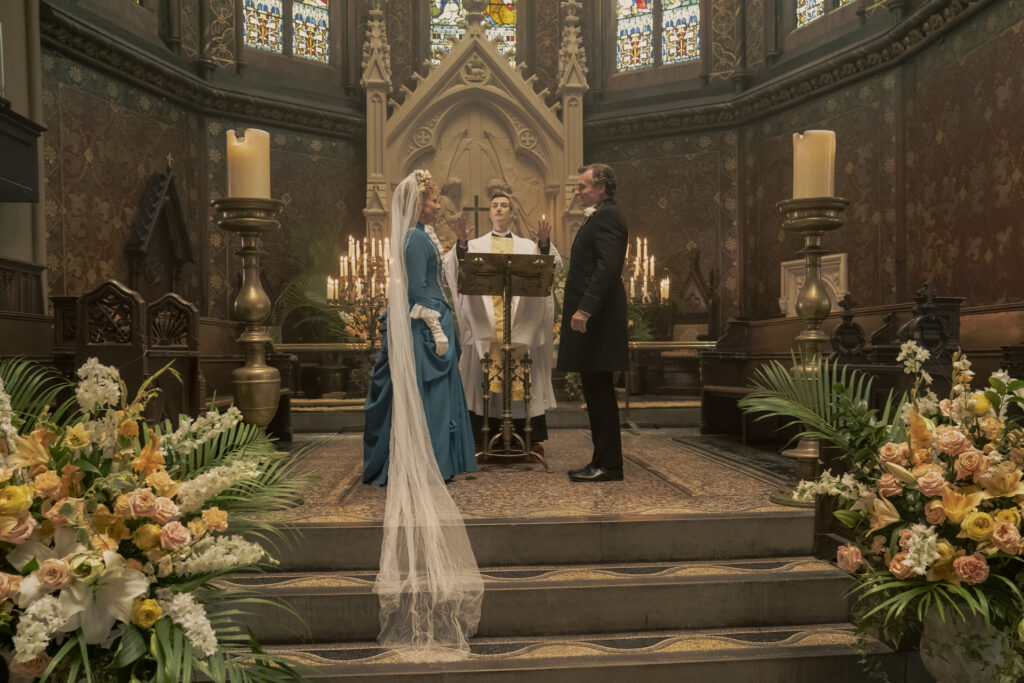
At her Newport cottage (which really should have a name by now), Bertha is hustling in a bustle as she prepares for the Duke of Buckingham’s dinner, saying things like “I like the menu, but we’re not there with the savory,” or “I think we’ll use the Bernardaud china with the Saint Louis glass,” or our personal favorite, “She tries her best, but her skill with a tiara is limited.” We clapped with glee at that last one, because we now have a line to quote every time we get bad service somewhere. This show is wildly inconsistent about almost all of its characters, but one enjoyably consistent aspect of Bertha is the way she consults with her staff. We doubt it’s particularly historically accurate, but she works with them like a project manager, as opposed to the sneering and barking that Agnes tends to levy at her staff. Speaking of inconsistent characters, Larry Russell is getting in Bertha’s way by being a drunk little brat who breaks her crystal and blames her for his breakup with Mrs. Blane. He’s not exactly wrong about that, but she has no interest in pursuing the argument with him. She tells him she only wants what’s best for him and also for him to get the fuck out of Newport because she won’t have him falling off chairs in front of the British aristocracy.
Back in New York, Maud Beaton is calling on Aurora Fane. The latter is in this week’s Most Hideous Dress and the former is wearing a hat that’s positively vulval in design. “You surely don’t want a man who’s never been interested in a woman before,” the chronically clueless Aurora assures her, when she brings up Oscar’s previous attempts to court Gladys Russell. Maud is rightly concerned that Oscar may be after her money and Aurora does a hilariously terrible job of attempting to reassure her that he’s pure of heart. “I’ve had a very uncomfortable few minutes,” she complains to her himbo husband, as if that’s something worth complaining about. Later, Maud brings Oscar to a meeting with her… business manager? About…securing a railroad or something? On behalf of her secret father Jay Gould? None of it is explained all that well. We’ve said many times before, going all the way back to the Downton Abbey days, that Gilded Age co-creator and co-writer Julian Fellowes will spend more time explaining a place setting than a business deal and we’re thrilled that this episode actually proved it. Anyway, Oscar eventually gets out his checkbook and we keep waiting for the other shoe to drop on this storyline. Maud doesn’t seem like a scammer, but she’s got an incredibly vague backstory and she sure is getting him to spend a lot of money on her.
At the Van Rhijn household, Agnes is being quite the bitch to Ada, who nervously announces her engagement to the Reverend Forte. Marian and Oscar are delighted, but Agnes beats them both with a riding crop. Look, we knew exactly how this little imbroglio was going to end, which is fine. It makes sense that Agnes would be threatened by Ada’s chance at happiness and it’s to the show’s credit that they didn’t take this in a more soap operatic direction by having her plot against the her sister. Even so, we continue to consider Christine Baranski largely wasted on this show and Agnes’ character to be somewhat broadly sketched in ways that feel like a disservice to the actress and the character. We liked that this conflict kind of tore the veil off of Agnes’ feelings, but we also thought her bellowing at Marian in her own drawing room (for the second time this season) seemed a bit less than dignified. Is she obsessed with propriety or is she just a harridan with a temper problem? At any rate, she announces that she won’t be attending and she forbids Oscar from doing so as well. Curiously, she imposes no such restriction on Marian or the servants being invited. Ada is terrified at her sister’s anger but Marian tells her to remain steadfast, put one foot in front of the other, and get her ass the hell out of that gloomy house as soon as she can. “I’ll be your maid of honor,” she announces, not waiting to see if Ada had intended to ask her.
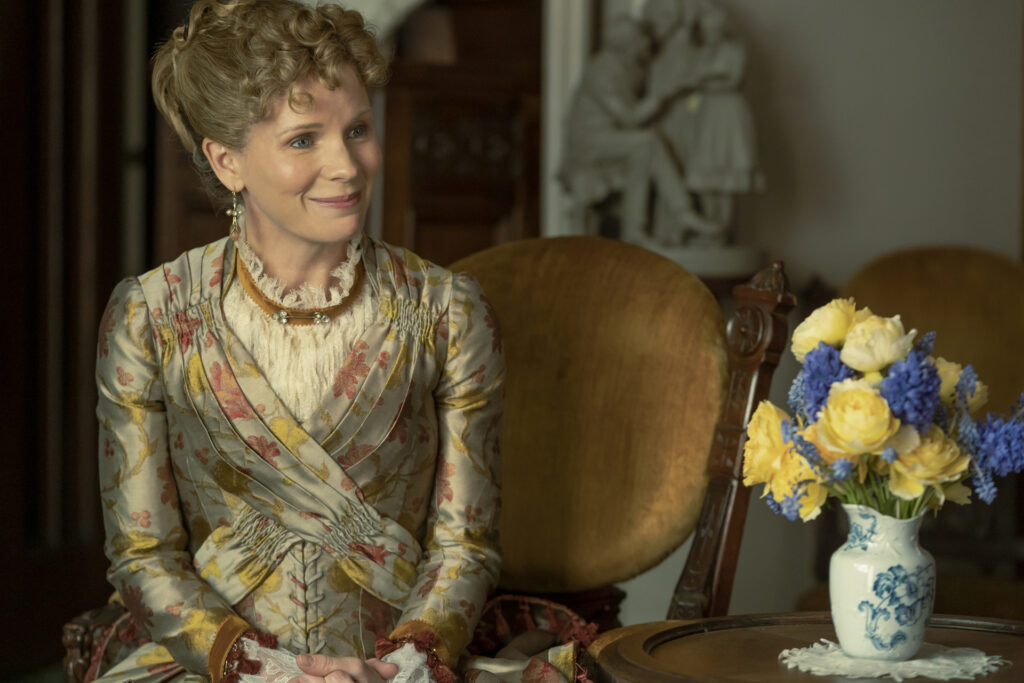
In Tuskegee, Peggy Scott is enjoying her glimpses of the New South and interviewing all of the bright-eyed, ambitious students at the Institute. Once again, Denee Benton is wonderful in these scenes – all of the actors are. It’s genuinely a pleasure to see a focus on this aspect of American society at the time, even if the transitions from one side of the story to the other are clumsy and it feels like we’re watching two entirely different shows. We have to resist the urge to suggest that Peggy’s story deserves a show of its own, if only because it would strip one of the few interesting characters out of this show. There are attempts to draw comparisons between the worlds depicted on the show, such as when it cuts from the lavishness of the Duke’s dinner to Peggy and Mr. Fortune eating in a Black-owned restaurant in Alabama, but the scripts and the direction don’t appear bold enough to make the comparisons particularly pointed.
In Newport, Mrs. Winterton is entertaining Mrs. Russell’s footman Mr, Barnes, which seems like an incredibly reckless thing to do, since none of these people truly have an expectation of privacy, given all the gossip among their set and the fact that they’re constantly surrounded by servants, who are also pretty gossipy around each other. We doubt any of this will matter all that much, because the story is determined to present Former-Turner in some sort of vacuum. It’s weird. All of the Russell servants know her story, as would anyone who lives on that block of 61st Street (Oscar recognized her immediately), and Mrs. Astor has already brought down the hammer on her after hearing about her past. At this point, practically everyone should know about it, so why is she not suffering more social backlash? Anyway, she asks about the preparations for Mrs. Russell’s dinner and asks for his help in her schemes to ruin it. Again, we love the bitchy turn this story has taken, but what Mrs. Winterton did here was easily traceable back to her and should, by all rights, destroy her reputation completely. It won’t, because the show needs a nemesis for Bertha. We just wish the writing was clever about it.
Agnes pretends to not know why Ada is refusing to come down to dinner. Why the pretense? No idea. Marian tears into her for “bullying” her sister and tells her that everyone is going to see her as petulant and angry. She throws down her napkin in something that is supposed to look like anger and storms out, prompting us to mutter the same thing we do every time she gets into a fight with her aunt: “Who paid for that dress, girl?” Later, in yet another dress, she runs into someone who looks like Larry Russell on the street, except he’s completely different from the Larry Russell who was drunk and heartbroken or the Larry Russell who was defiant and horny. This Larry is courtly and gallant with her, asking if he can come along while she picks flowers. We suppose the show is pushing these two together, but they don’t exactly generate sparks. She has more chemistry with unrelated-cousin Dashiell, although she seems far less receptive to him. Granted, a relationship with Larry would generate maximum drama and force Bertha and Agnes to finally deal with each other. Agnes goes to see Luke to confront him about the marriage and her objections to it. It’s a well-crafted scene, partially because Baranski and Robert Sean Leonard are good, but mostly because the script treats them both with respect and they have a conversation like adults. We like when Agnes is oppositional but dignified about it, as she is here. She lets her guard down just enough to admit that Ada is her only friend and the one person she has always relied on. Meanwhile, Bridget is sewing guitar straps onto one of Ada’s old dresses to try and make it presentable as a wedding gown and calling some old curtains “veiling” to cover for the shoddiness of the event. Downstairs, the servants wonder what will happen to all of them if the house empties out. Bridget snorts at the idea that Oscar would bring a bride home, which means she saw more than she let on when she walked in on Oscar and John Adams.
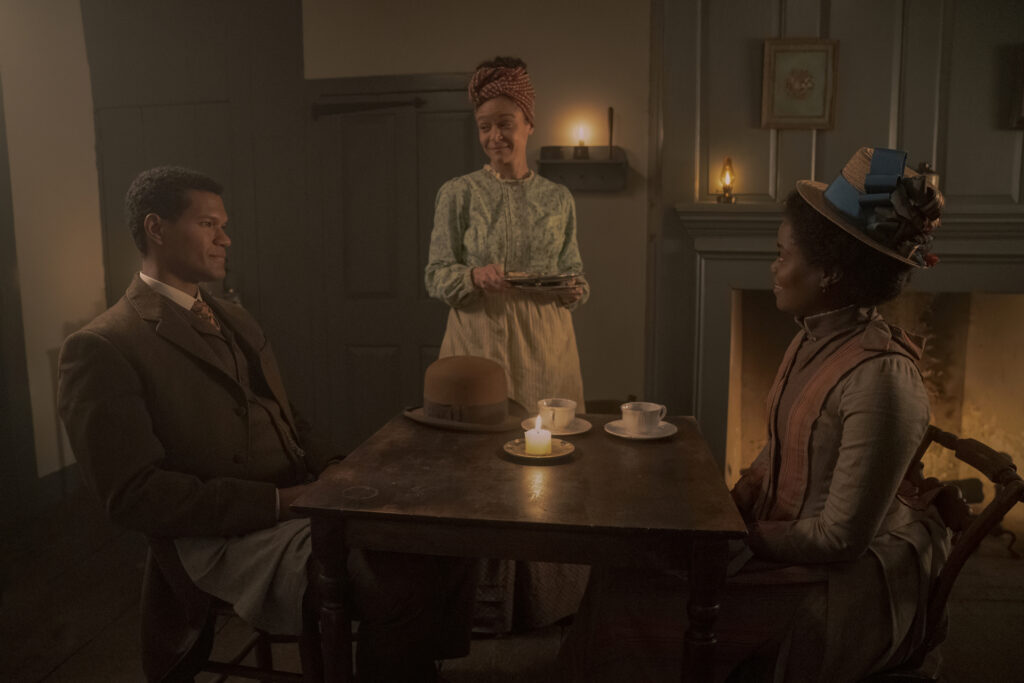
George has a meeting with yet another version of Larry Russell; one who is respectful of his father’s work and willing to ditch his own hard-fought career as an architect (budding though it may be) to do his bidding. He tasks his suddenly obedient son to check out the work on the Brooklyn Bridge. We like how George Russell is like this SUPER-robber baron, with his hand in literally anything that the show feels like exploring. Larry scuttles off to Brooklyn, where he meets Emily Roebling, who helpfully quotes her own Wikipedia entry at him when he figures out that she is pretty much the Chief Engineer of the project. “It’s an unjust shame!” he protests when he realizes that she’ll never get credit for it. And just like that, Suffragette Larry is born.
In Newport, Gladys doesn’t like her mother’s choice of dress for the dinner, protests meekly, and does as she’s told. Is Bertha drugging her children or something? Watson, the valet with the secret past, tells George all about Mr. McNeil’s plan to ship him off to San Francisco and it’s genuinely hilarious how pretty much everyone in the Russell household now knows the secret. They just all sit around talking about the thing this guy is willing to pay tons of money to go away. Then again, they all sit around talking about how Mrs. Winterton is a former maid and nothing ever comes of it. We wonder if George is going to set him up with some sort of financial job in order for him to stay in New York and save face with his daughter, especially since he saved the dinner in the most ludicrously anti-climactic way possible.
It seems Former-Turner’s plans to ruin the dinner are two-fold. First, the mystery chef is going to put something “revolting” in the first course (it’s never explained what it is because Fellowes never wastes time on details that don’t matter to him) and then the evil footman is going to dump soup on the Duke. Forget that this is a nearly verbatim lift from a similar plot in Downton Abbey, but what did the evil footman think was going to happen to him after this? Even if he could have passed it off as an accident (which would never fly since all of the servants know he’s friendly with Former-Turner), there’s no way he wouldn’t have been fired for it. Why would he ruin his livelihood for this? Anyway, the whole scheme was destroyed by… someone paying the slightest bit of attention in the kitchen. Still, it was enjoyably silly watching the high drama of soup being ladled out in incredibly luxurious surroundings. Fellowes knows how to make situations with stakes no one cares about seem like the height of melodrama and tension.
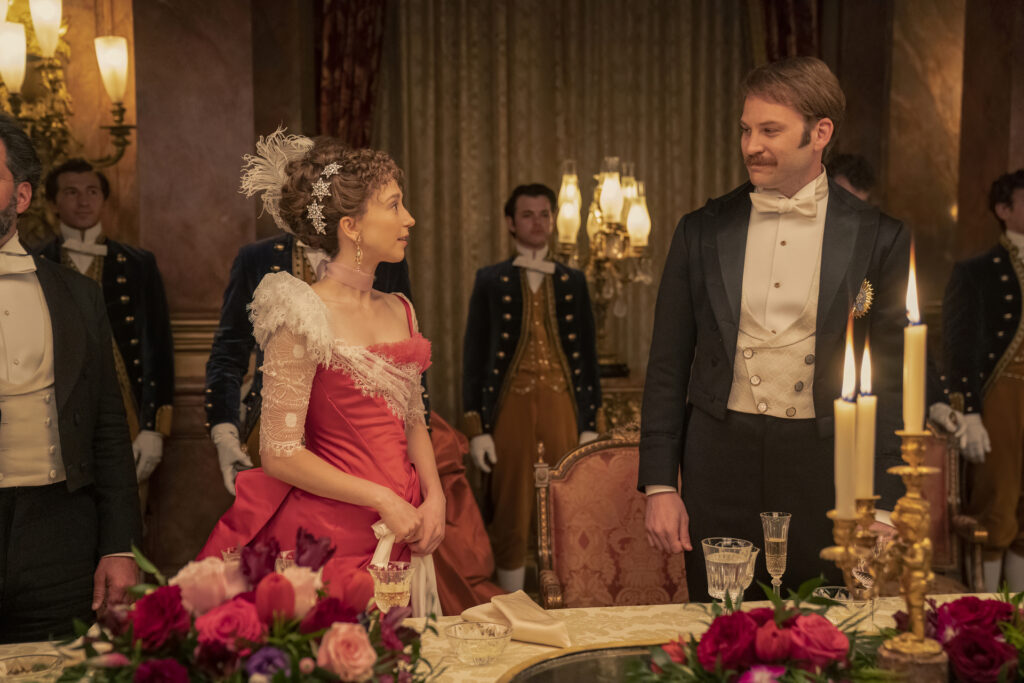
At dinner, Bertha’s earlier point about knowing what’s best for her is partially disproven when Gladys shows up in the second-Most Hideous Dress of the episode. Seriously, she looks like she works in a saloon. Then again, that may have been by design, since Bertha all but slapped a sign on her that read “RICH AND READY FOR A RING” and shoved her at the Duke. He seems a little smitten and she seems rather stupidly dismissive. Look, we realize it’s heroic for any young woman of the period to try and assert her own independence, but part of the reason characters like Marian and Gladys come off so annoying in their rebellions is because neither of them acknowledge the limitations of their available choices. Marrying a duke is no guarantee of a happy life, but he’s cute and young and in 1883, you’ve got to consider your best options in a system you’re powerless to change. It’s why Peggy’s so much more interesting than her white contemporaries in the story. Speaking of which, her tale goes exactly where we all knew it would as soon as she eagerly set off for Alabama. Of course we don’t mind a glimpse of the racism of the post-Reconstruction South, but we really hate that it’s being used as the impetus for a potential romance – especially since it diminishes the character of a real person, T. Thomas Fortune, who was married for several years at this point.
The dinner in Newport is a rousing success and, having made Mrs. Winterton swallow shit, Bertha is horny for George again. Back in New York, Ada gets married in a very sweet scene. Suddenly, a shot rings out and we momentarily consider that Agnes hired an assassin, but instead it’s just her slamming open the church doors in order to arrive in the most dramatic way possible. After ignoring both Marian’s and Luke’s pleas to support the marriage, what changed Agnes’ mind is a sharp word from Bannister (and another near-verbatim lift from Downton Abbey), reminding her that she’ll regret it forever if she doesn’t go to the wedding. Being Agnes, she arrives in the showiest outfit she owns. She momentarily makes it all about her, but in the end, she nods her approval. We doubt very much we’ve heard the last of her snide asides on the matter, but we hope this is an effort to give her character a reason to get up off her bustled ass and out into the world. Why, just think of all the people she could berate and lives she could attempt to control!
Pop Style Opinionfest: T Lo’s Holiday Extravaganza Next Post:
Australian Firefighters Calendar 2024
Please review our Community Guidelines before posting a comment. Thank you!


